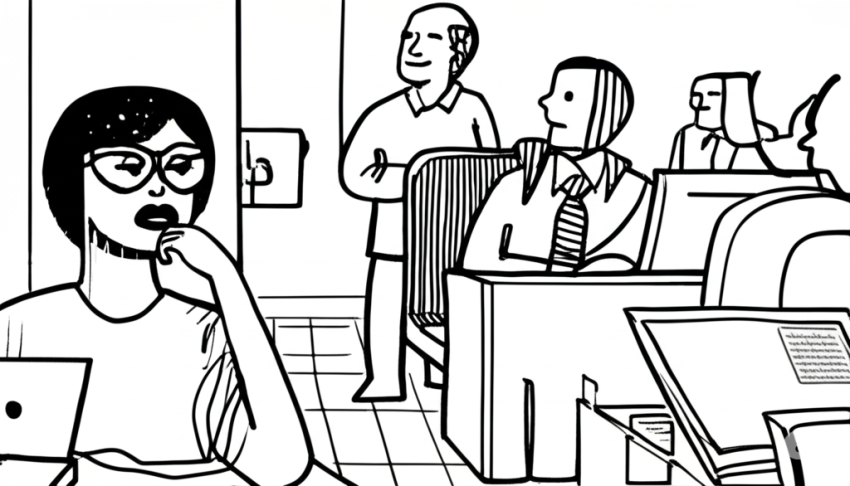At Helix Dynamics, the culture sparkled—on the surface.
The Seattle-based AI startup had become a rising star: innovation awards, investor buzz, and endless articles celebrating its “transparent, feedback-driven culture.” The office had all the signs of modern tech success—open layouts, kombucha on tap, motivational slogans in tasteful sans-serif fonts. Leadership held regular town halls and often declared: “We thrive on employee feedback.”
But inside the company, a quieter truth had taken root.
Feedback traveled freely—until it made someone uncomfortable.
It started with a ping.
Late Thursday evening, Marla Singh, CEO and co-founder, was scrolling through her inbox when a system notification appeared:
New anonymous employee feedback submitted.
They’d implemented the anonymous employee feedback tool nearly a year ago, part of an initiative to “amplify unheard voices.” At first, it buzzed with ideas—some trivial, some insightful. But after a few ignored suggestions and leadership’s slow follow-up, the messages dwindled.
Until now.
Marla opened the submission. Six lines stared back at her:
“You’re about to lose your best engineer.
Not because of pay.
Because they’ve been erased in plain sight.
Because loud ideas win, not the right ones.
Because your company rewards charisma, not contribution.
You still have time—but not much.”
No name. No department. Just precise language, stripped of emotion but weighted with truth.
Marla read it again. Then again.
It didn’t sound like a complaint.
It sounded like a warning.
The next morning, Marla pulled up her org chart. She began thinking about the quiet performers—the ones who showed up in code pushes and product breakthroughs but rarely spoke in meetings.
She thought of Mira Liang.
Mira had been with Helix for over a year—senior engineer, introverted, brilliant. Her work on Helix’s machine learning models had led directly to their most profitable feature launch. But in group settings, Mira barely spoke. Marla remembered a recent product meeting where Mira had hesitated to voice an idea before being cut off by Eric, the charismatic (and often domineering) CTO.
Mira hadn’t said another word that day.
The anonymous feedback suddenly took on a sharper focus.
That week, Marla did something unusual: she launched a confidential employee feedback initiative. One-on-one, anonymous conversations were held across departments. Participants were asked a single question:
“What do you wish leadership truly heard?”
The responses were eye-opening.
“Meetings feel performative. Real input doesn’t go anywhere.”
“Leadership says they want employee feedback, but only when it’s praise.”
“Quiet contributors are invisible. You only hear from the loudest people.”
It wasn’t isolated. It was systemic. And employee feedback made that clear.
Just as the feedback investigation wrapped up, Mira handed in her resignation.
Her message was brief. Respectful. “Excited about a new opportunity.”
But Marla wasn’t willing to let another silent departure validate the status quo.
She invited Mira to a private meeting—with herself, the COO, HR, and Eric.
Mira came prepared. Not to accuse, but to inform.
She brought examples of overlooked recommendations—feedback submitted in emails, Jira comments, sprint retrospectives. She pointed out decisions that could have been avoided if only someone had listened. She showed data: delays, rework, missed revenue.
And she said something Marla would never forget:
“Employee feedback only matters here when it’s convenient. Otherwise, it vanishes.”
The next week, things changed—dramatically.
Eric was moved into a strategic advisory role. Mira was offered a new position: Head of Advanced Research, with a mandate to create a cross-functional team powered by bottom-up innovation and inclusive decision-making.
More importantly, Helix completely overhauled its employee feedback systems.
The anonymous feedback tool was reintroduced with a new protocol: reviewed weekly, discussed monthly, and audited externally. Quarterly summaries were shared transparently with action items. Feedback wasn’t just collected—it was respected.
Marla also instituted a live, moderated employee feedback forum at each town hall. No pre-screened questions. No filters.
For the first time, employees believed their voices mattered.
In the six months that followed, employee retention improved by 44%. Product quality improved. Ideas surfaced from across the company—from interns, customer support, junior developers.
Helix hadn’t just changed structurally.
It had changed culturally.
To this day, no one knows who submitted that critical piece of anonymous employee feedback.
Some think it was Mira. She denies it—gracefully. Others believe it came from a teammate who saw the warning signs and took one last chance on the system.
Marla no longer tries to solve the mystery.
She had the message engraved and mounted on a brushed steel plaque in the lobby, beside the new employee feedback board.
It reads:
“Employee feedback only matters if you do something with it.
This time, we did.”
This story is proudly sponsored by Incogneato — the leading platform for anonymous, honest, and actionable employee feedback. Discover how Incogneato helps companies listen better, act faster, and build stronger workplace cultures.
